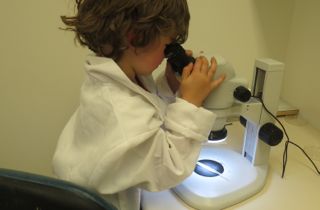Introducing blogging to future scientists
Posted by Megan Wilson, on 23 March 2014
Science communication using social media is becoming a very popular way of making science more accessible to the public, as well as a way to get your research noticed. This is true in developmental biology as it is in other fields. Can we use social media for “knowledge translation”, to make the latest in developmental biology news to assessable to everyone? Can we get more people interested in Science and developmental biology research?
Anat456 is a 4th year developmental biology paper taught in the Anatomy Department at the University of Otago, taken by post-graduate students (in the 4th year of a BSc Honours, MSc or Postgraduate Diploma in Science degree). We introduced a social media-based science communication assignment into the course last year, as a means of introducing blogging as a form of science communication, as well as using it as a way to assess their understanding of developmental biology. Anecdotally, some undergraduate an d postgraduate students have little insight into social media as a science communication platform, as distinct from the broader uses social media is put to.
d postgraduate students have little insight into social media as a science communication platform, as distinct from the broader uses social media is put to.
The assignment set within the course is to blog about a high-impact paper published in the field of developmental biology in the last year. The students are told to pitch their writing at the level of an audience with with first year university or high school level scientific understanding.
The particular skills we are looking to assess in the students through this exercise include:
– Their ability to put research into a broader context
– Their understanding of the research problem and aim of the paper and how the researchers tried to answer it. This requires an ability to interpret research methods and data correctly. Communicating Developmental Biology research requires a good understanding of it in the first place!
– Their written and visual communication skills (can they make a blog that attracts your attention).
– The ability to get and give constructive feedback to each other (through comments)
Within the class room there is limited opportunity for students to present their written work outside of the course or even to their own classmates in larger classes. Doing a blog assignment allows our students to present their work to a much broader audience. With that, we would like to welcome and encourage NODE readers to visit the Anat456 blog site https://blogs.otago.ac.nz/anat456/
Feel free to ask questions via comments to the Anat456 students. By doing so, you will help polish the next generation of developmental biologists!
Dr Megan Wilson
Anatomy Lecturer


 (5 votes)
(5 votes)
Dear Dr. Wilson, as a developmental biologist I totally agree with this point of view, we should definitely pass this to the next generation by such means. I think that ‘communicating’ developmental biology is not easy, however it is the center of many life-sciences disciplines as I learned during my studies. Sounds like a great initiative!
Good luck,
Dr. Ariel Rinon